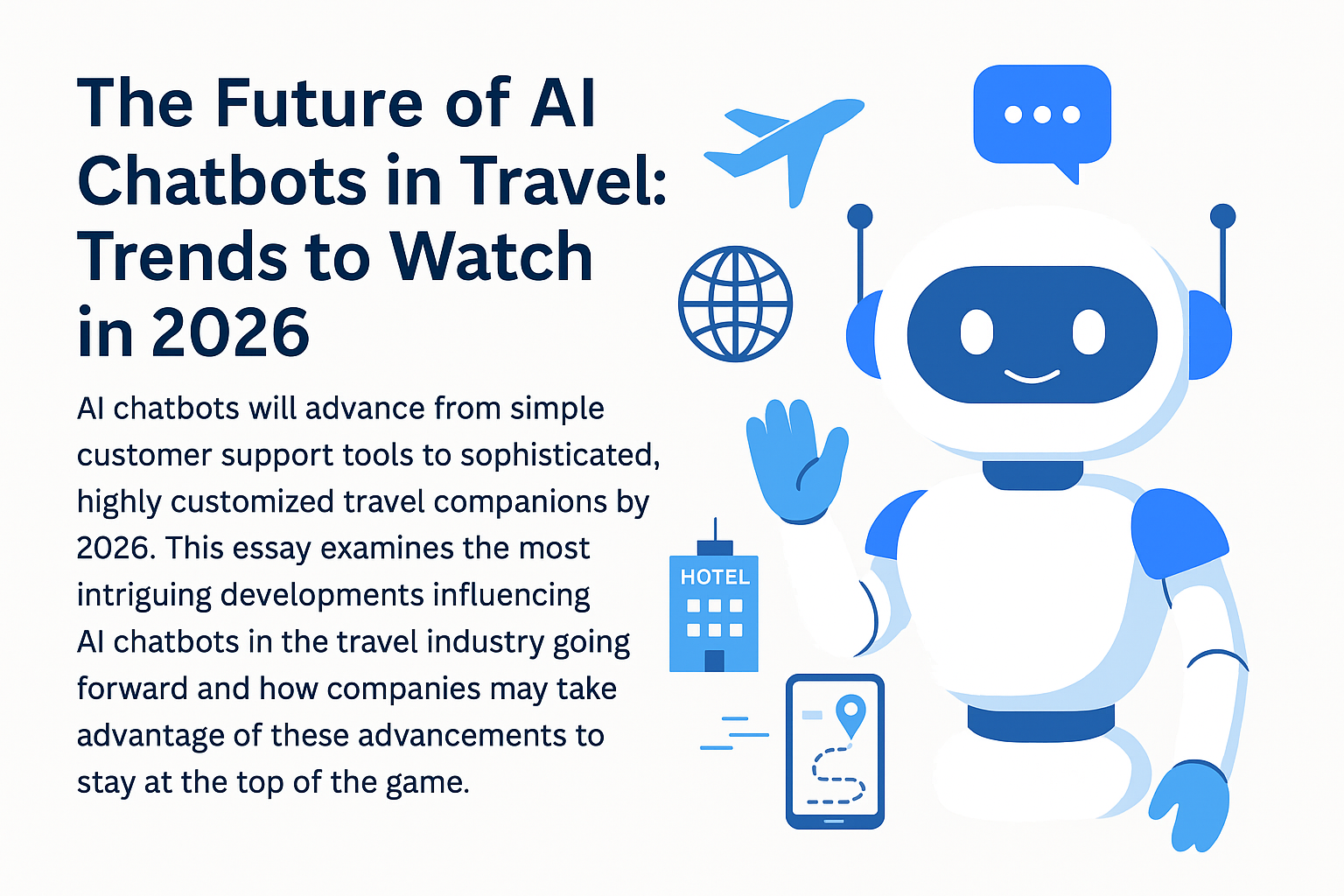Customization, effectiveness, and client satisfaction have always been key factors in the tourism industry’s success. AI chatbots have become an essential component of contemporary travel experiences as digital transformation speeds up across all verticals. These virtual assistants are changing how consumers engage with brands by offering everything from multilingual support and real-time updates to booking assistance and itinerary planning.
AI chatbots will advance from simple customer support tools to sophisticated, highly customized travel companions by 2026. This essay examines the most intriguing developments influencing AI chatbots in the travel industry going forward and how companies may take advantage of these advancements to stay at the top of the game.
1. Hyper-Personalization Through AI and Machine Learning
Travelers are no longer content with generic recommendations. In 2026, AI chatbots will leverage deeper integrations with CRM platforms and behavioral data to deliver highly personalized experiences.
Benefits:
- Improved conversion rates
- Enhanced customer satisfaction
- Increased customer loyalty
- Personalization will go from reactive to proactive—AI will anticipate traveler needs before they ask.
2. Multilingual, Context-Aware Conversations
Language has often been a barrier in international travel, but that’s changing rapidly. In 2026, AI chatbots will offer real-time translation capabilities powered by large language models (LLMs), allowing travelers to interact seamlessly in their native languages.
What’s more, context-awareness will play a crucial role. Chatbots will retain past conversations and adjust their tone, recommendations, and responses accordingly, just like a human agent would.
3. Voice-Powered Travel Assistants
With the rise of smart devices and voice search, voice-based chatbots will become integral to the travel experience. In 2026, we’ll see widespread adoption of AI-powered voice assistants that help users plan trips, book hotels, and even navigate airports or train stations hands-free.
Imagine:
“Hey TravelBot, what’s the weather like in Bali next week, and can you recommend budget hotels near the beach?”
Voice assistants will integrate with Google Assistant, Alexa, Siri, and even in-car infotainment systems, allowing for safe, on-the-go interactions.
4. Seamless Integration with Travel Ecosystems
AI chatbots of the future won’t operate in silos. They’ll be deeply integrated with various travel services—airlines, hotels, visa portals, local transport, insurance, and even emergency services.
By 2026, chatbots will become the command center for travel management, enabling users to:
- Modify bookings
- File insurance claims
- Check visa status
- Rebook missed connections
- Report lost luggage
- All from a single interface
Business Advantage: Travel brands can use these integrations to offer one-stop-shop experiences, increasing user retention and revenue through cross-selling.
5. AI Chatbots as Travel Companions (Not Just Assistants)
The shift from “utility bots” to emotionally intelligent companions will define the chatbot landscape in 2026. Thanks to advancements in sentiment analysis and natural language generation, chatbots will be able to:
- Detect user mood
- Offer empathetic responses
- Adapt tone and suggestions accordingly
This human-like empathy will differentiate leading travel brands from the rest.
6. AI-Powered Itinerary Generation & Dynamic Trip Planning
Forget generic travel guides. In 2026, AI chatbots will create dynamic, real-time travel itineraries that adapt to:
- Weather changes
- Local events
- Budget changes
- Time constraints
- Real-time traffic or closures
Example: A traveler’s hiking plan is interrupted by rain. The chatbot instantly suggests indoor alternatives nearby, like museums or spas, along with updated transport schedules.
This real-time adaptability will elevate chatbot utility from basic query resolution to a full-fledged travel concierge service.
7. Security, Privacy & Compliance
With great personalization comes greater responsibility. By 2026, AI chatbots will operate in compliance with evolving global data protection laws such as GDPR, India’s DPDP Act, and CCPA.
Privacy features will include:
- Data anonymization
- User-controlled data sharing
- Biometric authentication for sensitive transactions
8. AI Chatbots Driving Operational Cost Savings
For travel businesses, chatbots aren’t just customer-facing tools—they’re operational assets. In 2026, AI chatbots will:
- Handle 80–90% of FAQs
- Reduce support ticket volume
- Automate cancellations/refunds
- Manage peak-time traffic efficiently
9. Offline Functionality & Low-Connectivity Optimization
Not every destination has strong Wi-Fi. In 2026, we’ll see AI chatbots with limited offline capabilities or edge AI-powered features that can provide essential services even in low-bandwidth conditions.
10. Chatbots as Sales & Loyalty Engines
Beyond support, AI chatbots will become revenue drivers. In 2026, they will:
- Upsell flight upgrades or hotel amenities
- Recommend activities or dining options
- Offer location-specific discounts
- Trigger personalized loyalty program nudges
With the help of predictive analytics, chatbots will nudge users toward high-conversion actions, acting as silent sales representatives working 24/7.
Read Also:- AI in Modern CRM Building Better Customer Relationships
Final Thoughts
The future of AI chatbots in travel is not just about automation—it’s about transformation. As we move toward 2026, these bots will evolve into intuitive, context-aware, multilingual, and empathetic companions capable of delivering unmatched travel experiences.









